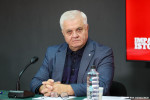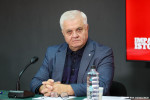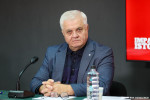
The Republic of Moldova’s accession to the EU, the EU support, the presidential election in Romania, the parliamentary elections in Moldova and the impact of these elections on the bilateral relations between the two sides of the Prut River were the topics discussed in an IPN interview with MEP Siegfried Mureșan.
Mr. Mureșan, on Friday you are on a visit to Chisinau. What is the purpose of this time?
This time it is a little different than usual, when I regularly come as Chair of the European Parliament Delegation for relations with the Republic of Moldova and the main objective is to advance the European integration agenda of the Republic of Moldova. Now I am in Chisinau for another purpose. On May 4 we have presidential election in Romania. We intend to talk to citizens of the Republic of Moldova who also have a Romanian ID card or passport, who have Romanian citizenship and who can vote in this election.
The objective is to explain the context to them, to explain the stakes, to tell the people of the Republic of Moldova that the dangers in Romania and in the Republic of Moldova are, in fact, the same and to ask them to go to vote and defend Romania's European path, as they defended the European path of the Republic of Moldova in last year's referendum and presidential election.
What are those dangers that you mentioned?
The Russian Federation, together with other autocratic regimes outside the European Union, is trying to weaken any liberal democracy, is trying to weaken independent and strong institutions at the national level, at the European level, and is trying to sow people's distrust in the European way of life, based on democracy, freedom of expression, freedom of the press, people's freedom to choose their own path in life, precisely because this European model of ours is antithetical to the Russian model, based on hatred, division, blackmail, poverty, force, threat.
We saw this in the election in the Republic of Moldova last year, when there was this interference. We saw this in the elections in Romania last year, when there was also interference. I believe that Romania's citizens are now better informed, better prepared, aware of the dangers of this risk of interference.
We didn't expect to see such a danger last year in Romania. Certainly, the Romanian authorities also realized the danger late. Being a member state of the European Union, we thought that such a thing could not happen to us, but, lo and behold, it existed. Now the authorities are better prepared; the citizens are better informed. I believe that the people will be able to vote in full knowledge of the facts and I believe that the risk of manipulating the electoral process in Romania now is much lower than it was last year.
We need to get information from credible sources. If we consume entertainment, let it also be of quality and let no manipulative acts and misinformation be hidden there. So, I think the people here also bear a large part of the responsibility.
The Republic of Moldova is also heading towards elections. To what extent could the result of the parliamentary elections influence the future of the Republic of Moldova and its European path?
The parliamentary elections are essential because the Republic of Moldova currently has a pro-European president, credible before the development partners, a president who has already managed to achieve a lot of things for the Republic of Moldova, support in difficult moments, the decision to grant the candidate status, the start of accession negotiations, enormous financial support. These things were possible because the European institutions had in Chisinau a trusted president, prime minister, government, authorities, who respect their commitments, who implement the measures they discuss and who respect European values.
It is clear that, in order for the European path of the Republic of Moldova to continue at the same speed, for the European Union to be able to help as much and as quickly, the Republic of Moldova needs the reform agenda to continue to be ambitious and it is clear that a pro-European government is needed in the future.
I am convinced that if there is a clear pro-European majority, a government supported by a transparent pro-European majority, the accession negotiations can go quickly and reforms will be implemented.
All these things, obviously, will be at risk if there is no pro-European government in the Republic of Moldova. The parliamentary elections will decide how fast it is reformed, how fast it is modernized and how fast the Republic of Moldova will integrate into the European Union.
When and how will the €1.9 billion aid for Moldova approved by the European Parliament reach Chisinau? What mechanisms will be applied to monitor how the money is absorbed?
The European Union at the end of last year offered the Republic of Moldova a €1.8 billion economic aid package for which, during the negotiations, I was responsible on the part of the European Parliament. We wanted to increase it to €1.9 billion.
We managed to increase the immediate support that will come to the Republic of Moldova, this pre-financing from 7%, the initial proposal of the European Commission, to 18%, a proposal supported by us, the European Parliament. In the negotiations, this was my main objective because I wanted the Republic of Moldova to receive support as comprehensive as possible, as quickly as possible and increasing this pre-financing is the best way. We increased it from 7% to 18%, i.e. from €115 million to €315 million.
When will this money come and how, to answer your question. In recent weeks, a special law already entered into force in European legislation for this aid package for the Republic of Moldova. The authorities in Chisinau must present to the European Commission the plan according to which they will absorb this money, i.e. what investments they want to make and what reforms they will do, in parallel, because this is an economic growth plan that provides money for investments, but which also stipulates a series of reforms. The authorities in Chisinau will present this plan to the European Commission. The European Commission will approve it and, immediately afterwards, within a few weeks, the Republic of Moldova will receive the €315 million pre-financing.
I think this pre-financing will come at the end of April or in the first part of May, during May.
After that, twice a year, the authorities in Chisinau will submit to the European Commission reports on the investments made, the reforms implemented, and twice a year, the European Commission will pay half-yearly installments to the official Chisinau.
How do we make sure that the money is well used? Of course, the competent European institutions will watch over these things. There is the obligation of transparency regarding the final beneficiaries, the ways in which European funds are spent and, every half a year, all those targets and everything related to reforms and investments that must be implemented so that payments can be made will be monitored. If there are delays or unfulfilled things in those reforms, then the European Commission will have to block some payments. I hope it will not come to this, but the rules are very clear.
The money will come twice a year, and the installments do not all have the same amount. This will be decided after the authorities in Chisinau submit the plan. So, they will have almost the same magnitude, but it also depends on the investments that will be implemented each semester and the reforms that will be carried out.
The approved aid includes loans and non-reimbursable funds. What is their proportion?
We have a share of about 20% non-reimbursable funds, money that the Republic of Moldova will never have to return to the European Union, and the rest are loans. They are reimbursable funds, money that the Republic of Moldova will return, but over an extremely long period, in the next decades, and at a very low interest rate.
The European Commission has great credibility on the financial markets, borrows at a low interest rate and makes money available to the Republic of Moldova exactly at the interest rate at which it borrows. So, the burden with these loans is considerably reduced for the Republic of Moldova compared to the burden that the Republic of Moldova would have borne if it had raised loans itself from the financial markets.
A number of countries that joined the EU over the years had a harder time accessing funds. What are the factors that allowed Moldova to gain the EU’s trust? What contributed to the advancement of the Republic of Moldova on the path of European integration?
There are a few factors. First of all, the Republic of Moldova has proven in recent years that it wants European integration. It voted for political parties, politicians who want to modernize and reform the country. The European Union sees that, despite the difficulties and despite the interference of the Russian Federation, interference in the elections, the people of the Republic of Moldova still found the strength to choose the path of European integration, the path of modernization and the European Union considers that it has the obligation to respond positively as well.
The second factor was the reaction of the citizens of the Republic of Moldova and the authorities immediately after February 24, after the moment of the illegal and illegitimate large-scale invasion of the Russian armed forces in Ukraine. The fact that the people of the Republic of Moldova opened their homes then to the people of Ukraine, who needed security and help, was something that the European Union appreciated because it was something in full accordance with European values. It was something that helped the European Union. The Republic of Moldova stabilized the situation at the eastern border of the European Union for the entire European Union. It was an important support.
The European Union understood, after the start of the full-scale war in Ukraine, that we can only live in safety and stability if our neighboring countries are also safe and stable. The European Union understood how important the Republic of Moldova is for the stability and security of the European Union as a whole.
All of these factors helped. We see, for example, the case of Georgia, where the government was declared a pro-European one, but in action it was an anti-European one. Georgia stopped. No decision was taken to start negotiations.
So, the favorable context created as a result of the invasion of Ukraine helped the Republic of Moldova. But it would not have succeeded if Moldova had not taken steps so quickly, if it had not been credible, if the government had not been a reliable partner and if it had not implemented the reforms. All the things that the Republic of Moldova receives now are based on its own merits.
Implementation of reforms. How do things stand in this regard?
After decades in which almost nothing happened in the judiciary, it is clear that starting the reforms was a difficult process. It is clear that there is resistance. It is clear that judges, prosecutors who have not been taught to be independent, strong, who have responded to orders in the past do not want this change and it is clear that changes come more slowly than people want. I believe, and the European institutions, the European Commission, say the same thing: the pace of reforms in the Republic of Moldova is good.
Let's not forget that in recent years, in parallel with the reform process, the Republic of Moldova has had to deal with even more energy crises. Of course, there was also the pandemic generated by the coronavirus. The illegal invasion of the Russians in Ukraine.
With all the consequences for energy policy, for security, for investments, the reforms have nevertheless begun. I understand the people who want more, faster, but if we look at the decades of stagnation, it is clear and I think we all feel that the Republic of Moldova is going in the right direction.
In Romania, too, sometimes things lasted longer than we wanted, but the process has been irreversible and those who thought that the reforms would not succeed were wrong, including in terms of the justice reform. I am convinced that the reform process in the Republic of Moldova will move forward. It will also be encouraged by the EU accession negotiations to the European Union because, after all, the accession negotiations mean a process of modernization and reform.
You mentioned the justice reform. Is this where you think the Republic of Moldova lags behind the most?
In Romania, it was the same. The greatest resistance is in terms of justice because there are people there, there are forces that do not want the reform to succeed. It also comes from those who, perhaps, broke the law in the past and do not want to be held accountable, from those suspected of acts of corruption. So, here there is resistance. This is an area where I think a lot of attention is needed, but I think it is also one of the most important and urgent areas because, if the citizen does not trust the act of justice, this also leads to a level of investments below potential.
If the investor is not sure that, by following the rules, nothing bad can happen to them and the one who violates the laws of the country is punished, then perhaps an investor also thinks twice before investing. The justice reform is important for people's trust in the state, for economic development, for investments.
In the 2024 referendum on the European integration of the Republic of Moldova, several localities or even regions, such as ATU Gagauzia, which received generous investments from the EU, voted: No! What needs to be done to reduce the number of Eurosceptics?
In this regard, I believe that the state of the Republic of Moldova should not be left alone. Here too, the European Union must do more. One of our decisions at European level and the conclusions of the last months is that the European Union's involvement in the Republic of Moldova should not be limited only to discussions with the authorities. Greater contacts are needed at local, regional, societal levels.
More visits to the local level are needed and we, as representatives of the European Parliament, other European institutions, the European Commission, will focus on our presence in Chisinau in the future, and in regions in the north, in the south of the Republic of Moldova, to inform the people.
I do not think we are going to convince everyone right away that the European Union means prosperity, jobs, development, modernization, but even a small part convinced during the first year, and continued work, I think will lead to significant change in the long term.
So, the European Union must also be more present there to tell the people about the good things it is doing and to tell them that the European integration is good for all the citizens of the Republic of Moldova, regardless of whether they live in the village or in the city, whether they are young or old, regardless of the social or professional category and regardless of whether they speak Romanian or other languages at home.
European integration supports everyone - a school modernized with European funds, a hospital built with European funds, a modernized road brings victory to all the citizens of the Republic of Moldova.
Even in the so-called Transnistrian region, a large part of exports, over 70% or almost 80%, go to the European market. Those producers from the so-called Transnistrian region would not have markets if the Republic of Moldova had not had an association agreement, free trade with the Union. They also benefit.
To return to the elections in Romania, we see that gradually, with each election, the number of polling stations established on the territory of Moldova increases. Is Romania counting on the vote of Moldovans who also have Romanian citizenship?
It is natural that any citizen of the Republic of Moldova, who is also a Romanian citizen, can vote and, wherever polling stations are needed, the Romanian state opened them.
The presidential election in Romania in May will also be very important for the Republic of Moldova, as important as the parliamentary elections in autumn because we also have extremist, anti-European, populist forces in Romania, which want to keep Romania stagnant and slow down Romania's European integration.
These political forces have a candidate in the presidential election. They also had a candidate in last year's presidential election and our objective, as pro-European politicians in Romania, is to stop the rise of anti-European extremists.
Just as in the Republic of Moldova you had Stoianoglo and Dodon, so in Romania there was Georgescu in last year's election and there is this Mr. George Simion in the current election, who, by the way, is also banned from entering the Republic of Moldova and Ukraine.
Under no circumstances would it be good for Romania, nor for the Republic of Moldova, for Romania to elect a president who would distance us.
It is very important for Romania to have a pro-European president and a president who will continue to help the Republic of Moldova, with everything Romania can offer. That is why it is important for the citizens of the Republic of Moldova to understand the stakes of these elections, to vote, to vote for a pro-European candidate.
The candidate of our party, which I represent, the National Liberal Party, Mr. Crin Antonescu, is a guarantee of the continuation of a close relationship between the Republic of Moldova and Romania.
Thank you very much for your time.
Thank you too.
Irina Boțu, IPN

















